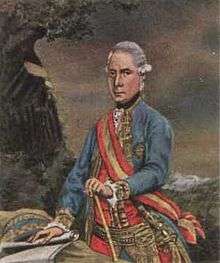Symphony No. 69 (Haydn)
The Symphony No. 69 is a symphony by Joseph Haydn in C major, Hoboken I/69, known as the "Laudon" symphony. Composed around 1775–1776,[1] it represents a stylistic departure from the composer's earlier intense Sturm und Drang period and was written at the same time as Haydn was writing numerous comic operas. Despite the lighter tone, however, the symphony is "as finely crafted, as interesting, indeed as original, as the preceding ones, albeit very different in character."[2]

Nickname
The nickname originated with Haydn's publisher Artaria, who issued a version for solo piano in the mid-1770s. As a device for increasing sales, Artaria attached to the work the name of a popular Austrian war hero, General Ernst Gideon Freiherr von Laudon. Haydn agreed to make the keyboard arrangement, but insisted on omitting the final movement as inappropriate for keyboard performance. However, he endorsed Artaria's sales maneuver, writing to his publisher on April 8, 1783 that the title "wird zu Beförderung des Verkaufs mehrs als zehen Finale beytragen" (will produce more sales than ten finales).[3]
H. C. Robbins Landon's view that the title "is Haydn's own ... to honour the famous Austrian Feldmarschall who conquered the Turks and made Europe safe for Austrian monarchism" is inaccurate.[4] As a post-facto addition, the title was borne from purely economic motivation and does not reflect any conscious military theme in Haydn's original conception.[5] Instead, the similarities of the festive opening with the composer's earlier 48th symphony was likely the inspiration for Artaria's idea.
Movements
The "Laudon" symphony is scored for two oboes, two bassoons, two horns in C basso, two trumpets, timpani and strings. It is in the standard four movement form, marked as follows.
See also
- Artaria
- List of symphonies by name
Notes
- James Webster, "Program Notes" Oiseau-Lyre CD 460-776-2 (1999), 13
- James Webster, "Program Notes" Oiseau-Lyre CD 460-776-2 (1999), 12
- Joseph Haydn: Gesammelte Briefe und Aufzeichnungen: unter Benutzung der Quellensammlung von HC Robbins Landon (Kassel: Bärenreiter, 1965), 127.
- HC Robbins Landon. Haydn Symphonies (Seattle: University of Washington Press, 1966), p. 33.
- Horst Walter, "Über Haydns 'charakteristische' Sinfonien," in Gerhard J. Winkler, ed., Das symphonische Werk Joseph Haydns (Eisenstadt: Burgenlandisches Landesmuseum, 2002), 65–78